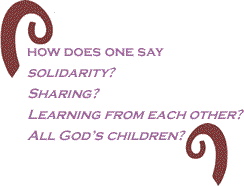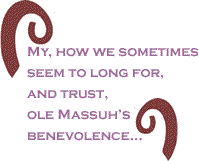
|
|||||||||||||||||||||||

|
|

Custom Search
|
|
 |
|
A word to my fellow U.S. African Americans: Get real - and stop hatin’. I’m referring to growing anti-immigrant sentiment in black communities in this country. After reading reports containing the disgusting news of black workers cheering at government immigrant-hunting raids,e.g., “Immigrant Raid Divides a Mississippi Town,” Miguel Bustillo and Richard Fausset, LA Times, August 31, 2008, seeing revolting pictures of African Americans marching side-by-side with the Minutemen (e.g., “Members of the Chicago Minutemen and African Americans Against Illegal Immigration protest Wednesday the alleged use of undocumented workers at a Kellogg's bakery in Chicago” By Scott Olson, Getty Images, originally published in “Republicans Plan Dueling Hearings on Immigration,” Kathy Kiely and David Jackson, USA Today, June 22, 2006), and hearing too much lip from black folk against immigrants documented and undocumented, I’ve had enough. There’s no need for all of this hate thrown at immigrants. It demonstrates a shallowness in our thought that is unbecoming of a people supposedly seeking justice and equality for all people. The problem isn’t that we’re being overrun by immigrants, that they’re taking our jobs away and are the cause of our un- and underemployment, or any other such hype.
Take, for example, this whole thing of immigrants supposedly stealing our jobs. Now, there’s something that is blown way out of proportion. There are, admittedly, some localized examples of job competition between immigrants and African Americans. But does it happen on the widespread basis that much of our complaining would imply? No. It is important, according to Dr. Steven Pitts of the UC Berkeley Labor Center, for African Americans to remember that the job crisis in the black community - unemployment and low-wage work - stems from a number of causes, including continued racial discrimination in the labor market, the impact of mass incarceration policies, substandard education at the K - 12 levels, and the decline of unionization. [See Job Quality and Black Workers, Steven C. Pitts, BC Issue #246.] Instead of focusing our anger and energy on conditions of racism and economic injustice that adversely affect our labor situation - conditions that have existed for many years - we are taking our frustrations out on groups of people who are exploited by owners to work in largely underpaid, unsafe, non-unionized conditions, solely because the economic or political situations in their homelands have driven them to accept such meager conditions for the purpose of survival. We need to chill on that. We need to redirect our attention to changing the conditions that prevent us from greater ownership and self-determination economically, and that destabilize economies and social situations in other countries, driving folk to desperate, last-resort migration. We even get attitudes about their language, getting indignant about what or how they’re speaking, just because we don’t understand or are a bit inconvenienced by it. Yeah, right - as if us speaking our slave master’s English gives us the right to be so holier-than-thou toward them as they speak their slave master’s Spanish (or Portuguese, or French, or Dutch, or differently-accented English, or their own indigenous language, or whatever). Here’s an idea: before we start gettin’ all hyped about “English only spoken here,” why don’t we respect their cultures and linguistic traditions, appreciate the fact that the vast majority of them are already learning English if they don’t yet know it (and are balancing the rest of a crazy, oft-persecuted life at the same time), and - dare I say it - brush off our high school text books and learn a bit of another language ourselves. Hmmmm - how does one say solidarity? Sharing? Learning from each other? All God’s children?
So it’s particularly curious that, when our Afro-Latino/a cousins do get here - under whatever circumstances - we too often fail to welcome them fully. Perhaps
the most twisted part of this drama is the fact that the static
so many of us are throwing toward immigrants is being fueled by
a decidedly racist, xenophobic anti-immigrant movement - one seeded
by hate-group money and propagated by organizations and leaders
who seem but one or two steps removed from wearing white hoods and
burning crosses. [See, for example, information from the Building Democracy Initiative.]
After these ultra-conservative vigilante and anti-immigrant groups
finish barricading Yes, I know there are prejudices, stereotypes and generally bad attitudes among many Hispanics against African Americans. [See, for example, “Roots of Latino/Black Anger,” Tanya K. Hernandez, LA Times, January 7, 2007.] Such
negativity is unacceptable. We should note that it is, at least,
partially due to the rampant anti-black racism in Indeed, Latino/a, African continental, Asian and East European leaders must foster self-examination and dialogue within their communities about anti-African American sentiment - examining the existence of such, exploring the roots thereof, and working toward its eradication.
However, let’s sweep around our own front door before we sweep around theirs. Unless we examine, with honesty, our own susceptibility to unfounded assumptions and needless negativity toward immigrant communities - and act to change such - we have no moral high ground to speak from. We need to learn their stories, striving to walk a mile in their shoes before condemning them. (A great way to start is by reading the powerful compilation Underground America: Narratives of Undocumented Lives. Peter Orner, ed.) We must also be astute enough to see the divide-and-conquer campaign of the anti-immigrant movement for what it is. If we don’t resist this racist ploy, not only will immigrants continue to be oppressed, but our own civil liberties will be under increased threat. [See “Are African Americans Missing the Point on Immigration?”, Eric K. Ward, Imagine 2050, August 6, 2008, and “Attacks Against Immigrants Attack Black America”, Eric K. Ward, Imagine 2050, June 21, 2008.] I
don’t mean to imply that the entirety of the African American community
has responded negatively toward immigrants. On the contrary, many
have supported immigrants’ rights, understanding M.L. King’s assertion
that “an injustice anywhere is a threat to justice everywhere.”
Personally,
however, I have to take it further than that and reiterate: let’s
get real, and get over it! Immigrants - documented and undocumented
- are here, and will continue to come.
BlackCommentator.com
Guest Commentator, Kenneth R. Brown, II, is the Director of Which
Way Forward, a program of the Center
for New Community in |
|
Any BlackCommentator.com article may be re-printed so long as it is re-printed in its entirety and full credit given to the author and www.BlackCommentator.com. If the re-print is on the Internet we additionally request a link back to the original piece on our Website. Your comments are always welcome. eMail re-print notice
If you send us an eMail message we may publish all or part of it, unless you tell us it is not for publication. You may also request that we withhold your name. Thank you very much for your readership. |
|
| |
|
| October 16, 2008 Issue 295 |
|
| Executive Editor: Bill Fletcher, Jr. |
| Managing Editor: Nancy Littlefield |
| Publisher: Peter Gamble |
| Est. April 5, 2002 |
Printer Friendly Version
in resizeable plain
text format or pdf
format. |
| Frequently Asked Questions |
 |

|
 |
 |
 |
| |
| |






























 The
real problem is our own prejudice, our own xenophobia against immigrants,
and the mind games that the racist anti-immigrant movement is running
on us. We’ve been oppressed and stepped on; now, in turn, we find
immigrants a convenient group for us to step on ourselves. In a
society that is already frighteningly antagonistic against those
who come to these presumably welcoming shores, too many in our
community have added their voice to the unwelcoming cacophony directed
against those who now arrive either through formal means or through
desperately-informal risks. I find this fascinating, given that
our own arrival in this country wasn’t, to be painfully understated,
with red carpet welcome and five-star conditions offered to us by
European American (white) government and business. Perhaps some
of us think that our history of suffering permits us to disregard
the suffering of others. Siding with the noisy voices of hate against
the “other,” such persons are merely monopolizing the idea of suffering,
not having fully grasped the context in which immigrants find themselves
coming here.
The
real problem is our own prejudice, our own xenophobia against immigrants,
and the mind games that the racist anti-immigrant movement is running
on us. We’ve been oppressed and stepped on; now, in turn, we find
immigrants a convenient group for us to step on ourselves. In a
society that is already frighteningly antagonistic against those
who come to these presumably welcoming shores, too many in our
community have added their voice to the unwelcoming cacophony directed
against those who now arrive either through formal means or through
desperately-informal risks. I find this fascinating, given that
our own arrival in this country wasn’t, to be painfully understated,
with red carpet welcome and five-star conditions offered to us by
European American (white) government and business. Perhaps some
of us think that our history of suffering permits us to disregard
the suffering of others. Siding with the noisy voices of hate against
the “other,” such persons are merely monopolizing the idea of suffering,
not having fully grasped the context in which immigrants find themselves
coming here. Consider,
moreover, the situation of Afro-Latinos/as who already feel caught
in a crossfire from other Hispanics whose ancestry and, therefore,
appearance and features lie more along European and indigenous lines,
and African (North-) Americans - both being groups that have,
too often, made it hard for Afro-Latino/as to feel accepted. Let’s
not forget that there is a larger number of black folk in the western
hemisphere outside of the
Consider,
moreover, the situation of Afro-Latinos/as who already feel caught
in a crossfire from other Hispanics whose ancestry and, therefore,
appearance and features lie more along European and indigenous lines,
and African (North-) Americans - both being groups that have,
too often, made it hard for Afro-Latino/as to feel accepted. Let’s
not forget that there is a larger number of black folk in the western
hemisphere outside of the 






